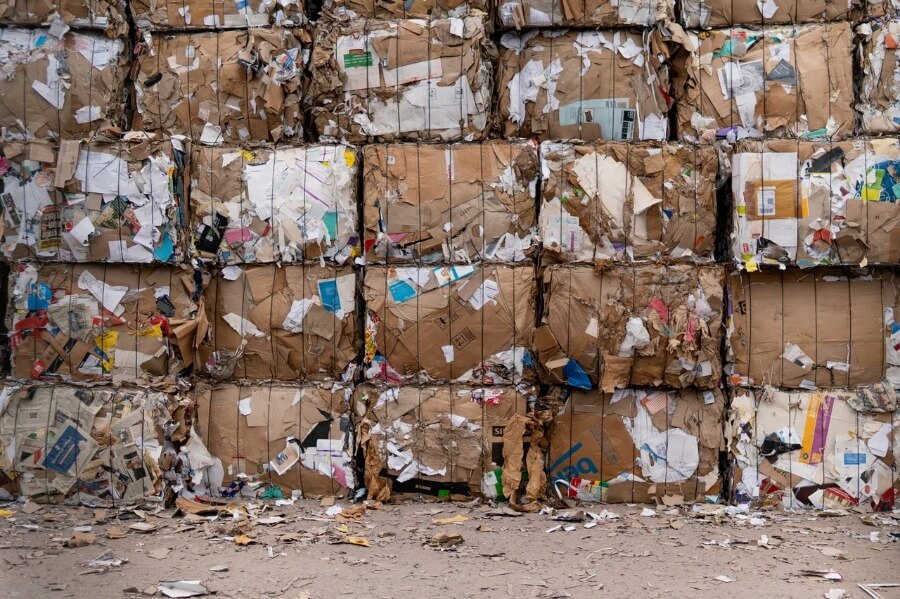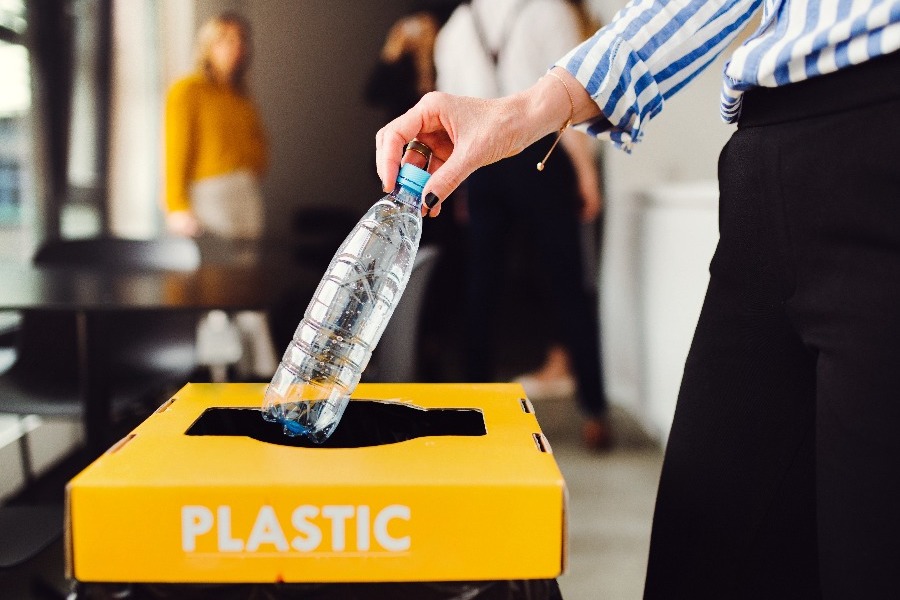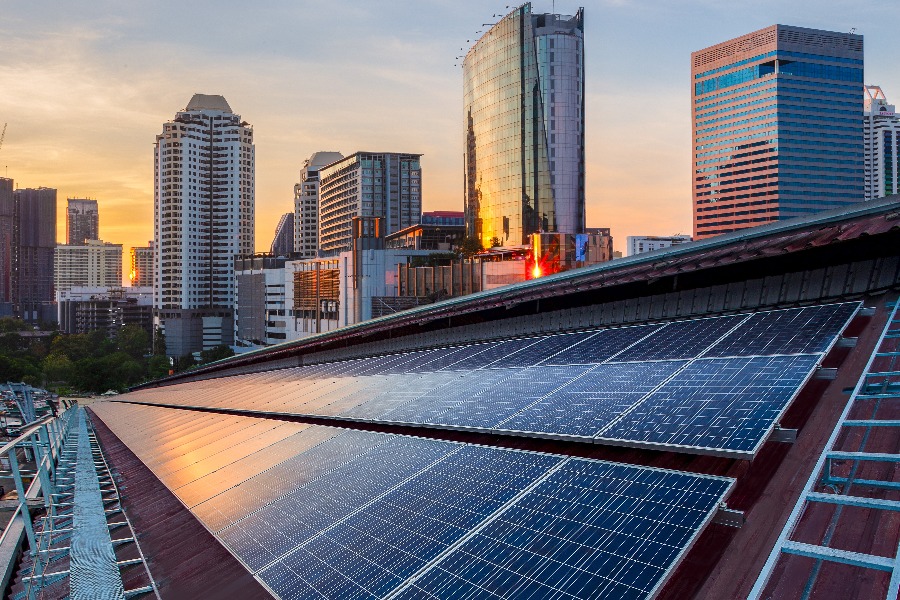
Combined, the UK's businesses generate around 44 million tonnes of waste each year. Every misprinted document, every takeaway cup, every apple core consumed at the desk...too much of it is ending up in landfills.
And it sounds harsh, but it's true - if your business isn't part of the solution, it's part of the problem.
Fortunately, there are several (relatively pain-free) ways to equip your business for sustainability success; to produce less waste, and get better at handling the waste you do generate.
Better still, most of the tips we've pulled together below don't require a major monetary investment. They're more about a perceptual shift - cutting out the complacency, educating your staff, and facilitating an environment where recycling is easy - not exhausting. And where everyone buys in to help not only your business succeed, but the planet, too.
So read on - here are five ways your business can create less waste in 2022.
Cut Down on Your Paper Usage

If there's one type of waste UK offices are particularly guilty of producing, it's paper.
Think about it. Have you ever printed a document that could have been easily accessed online? Or accidentally printed out more copies than you needed, only to have to consign tens - even hundreds - of reams to the waste basket?
If this sounds like you, rest assured - you're not alone. The average office worker uses around 10,000 sheets of paper every year - and data from Xerox suggests that almost half of those documents are discarded within as little as 24 hours.
Worse still, 30% of all documents are never picked up from the printer at all. So what can your business do to put paid to its paper profligacy?
Well, you can start by considering whether it even needs a printer in the first place. It's 2024, after all! Everything can be (and often is) done online. With platforms such as Google Docs allowing your team to collaborate in real time, from the same document, there simply aren't that many reasons to possess physical copies of what you're working on.
If you must have a printer, though, there are still a few ways you can cut down on the wastefulness.
Making sure that you're printing on both sides of the sheet, for instance, will cut your paper expenditure in half. Reusing surplus-to-requirements documents as scrap paper will also help (who needs Post-It Notes, anyway?), as will reducing the margin sizes of anything you need to print in Google Docs or Microsoft Words.
Sometimes, cutting out the paper usage is as simple as setting some boundaries for your staff - some ground rules that govern printing best practice. You could set stricter requirements for what your employees are allowed to print out, or make it harder to do so by restricting login access.
Or, better yet, don't buy a printer at all. Sometimes, the simplest solutions are the best!
Make it Easier to Recycle

It's a scenario that everyone who's ever worked in an office will be familiar with.
Sitting at your desk, you - with a last satisfying slurp - finish your coffee. What do you do with the empty takeaway cup? Well, you could cross the room and place it in the recycling bin. Or, you could take the easy option: toss it in the bin underneath your desk, and forget about it. Which route do you take?
Herein lies the issue at the heart of any business that's producing more waste than it should be - that it's too easy for staff to not recycle.
At the moment, it's often easier for office staff to simply bin their rubbish, rather than recycling it. The key to creating less waste for your business, then, is to flip that equation on its head. To make it easier for your employees to recycle paper, glass, and plastic rather than throw them away.
To do this, start by equipping your office with large, clearly-labelled recycling bins. Colour-coding these is a great idea: say, green for glass, yellow for plastic, blue for paper, and black for non-recyclables.
And those individual bins, located under each desk? They've gotta go. Instead, locate any rubbish bins in strategic points around the office - ideally, next to the recycling bins. When faced with a simple, well-signposted set of options, people will usually make the right choice.
Of course, you have to practise what you preach - and that means that you, as a business, need to embrace green approaches as much as possible. Whether that's recycling old computers or brushing up on the latest recycling facts and figures, make sure your business is always leading from the front.
Reduce Your Packaging Waste
If you're an eCommerce business, reducing waste is often easier said than done.
Your business model, after all, relies on you sending your products to your customers. To get there, those products first need to be protected (often in plastic wrap or polystyrene chips), then packaged and sent off - usually in a cardboard box.
We all know that eCommerce boomed in the year following March 2020. But what you might not know is that corrugated box shipments also increased. And by a whopping 9%.
With all that packaging required, isn't business wastage unavoidable?
Yes…and no. The short answer is that, while packaging is necessary, waste isn't - you just have to get smart about how you manage it.
Instead of using polystyrene chips, paper, or plastic to package your goods, think about shredding any documents you no longer need, then using them as packing material. You'll save money on packaging, find a purpose for old documents, and be able to visibly demonstrate to your customers that you're committed to waste-free commerce. Sounds like a win-win to us!
Fuel Your Business' Operations with Solar Power

As any business owner that's looked at their electricity bill recently will know, energy costs are rising.
So why not combat this - and make your business more energy-efficient while you're at it - by installing solar panels at your office? Placed in a strategic location on your business premises' roof, solar panels produce clean, renewable energy - potentially saving you thousands of pounds in the process.
With solar panels, you can power your business naturally: reducing your reliance on both the burning of fossil fuels, and the grid. Depending on how much energy you're producing, you could even sell electricity back to the grid - so solar panels can offer alluring financial benefits, too.
Of course, there's also the matter of the Energy Savings Opportunity Scheme (ESOS) - and the energy audits it brought in for large businesses. With the potentialities of more energy regulation in the future, why not put your business a step ahead - and embrace solar power sooner, rather than later.
Plus, solar panels aren't as inaccessible - or expensive - as they used to be. Solar panel costs have fallen by 25% since 2014, and many of the best solar panels on the market now come with a 25-year (or a lifetime) guarantee.
There's the initial price of investment, sure - but beyond that, solar panels cost little to maintain, and are one of the most low-risk, high-impact changes your business can make to reduce its wastage. And its carbon footprint.
Adopt Bulk Bag Packaging - and Buy in Bulk
When it comes to reducing business waste, buying in bulk is a tried-and-tested strategy. It's an 'oldie, but a goodie' - and for good reason.
For one, buying in bulk tends to reduce the overall packaging your business is directly responsible for. Bulk purchases from a single supplier - coming from a single place of distribution - also mean that items can be bundled together and transported at the same time.
This, of course, cuts down on the amount of carbon being produced by the vehicles delivering goods to your business - and the amount of paper being wasted in the administrative processes!
Buying in Bulk Goes Hand in Hand with Switching to Bulk Bags.
Bulk bags (short for flexible intermediate bulk containers, or FIBCs) are large industrial containers. Made up of a durable, flexible (hence the name!) polyethylene material, bulk bags are ideal for transporting a wide variety of products. They're also big - around 45-48 inches in diameter, and almost 80 inches in height - making them suitable for transporting larger volumes of products.
But bulk bags aren't just convenient for you - they benefit the environment, too.
Bulk bags are reusable, and - should they become damaged - can be easily recycled to make more. On top of empowering your business to create less waste, bulk bags are also more cost- and space-effective - helping you increase your bottom line, while decreasing your carbon footprint.
Creating Less Commercial Waste: A Mindset and a Method
There are a lot of ways to reduce your business' impact on the planet.
Cutting down on your paper and plastic excesses, for instance. Installing solar panels. Buying in bulk works, too - as does using bulk bags, recycling old computers, and curtailing your packaging waste.
But to truly implement change - the long-term, meaningful, and sustainable kind, that is - reducing your business' waste needs to be about more than the methods, but the mindset. And to go beyond the processes, to the people.
So have a think about how you can get your employees on board with your company's waste reduction initiatives. Educate them on the benefits of a greener approach. Motivate them to get on board with your plans, and - as we've discussed - make it as simple as possible for them to take part. And if that doesn't work, incentivise them to be better.
As a business owner, your responsibilities don't end with your staff, customers, or shareholders. You owe the planet, too - and to do your bit, you'll first need to cultivate a commercial culture that values our collective future; one looking to reach not for the rubbish basket, but to the recycling bin.
As the old proverb goes, "The best time to plant a tree was 20 years ago. The second best time is now."
So remember, it's never too late to start creating less waste, for a more desirable future. It won't always be easy, but it will be worth it - trust us!
ISM Waste & Recycling
Here at ISM Waste & Recycling, we provide waste management services that helps your business to reduce waste, protect the environment and save you money on your waste management. Please call us on 01706 823001 for more information about getting started.
Waste Management Services
Contact Us